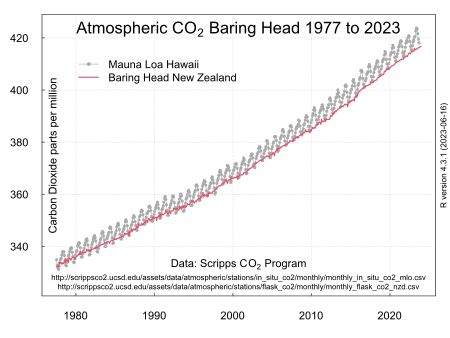
Back التغير المناخي في نيوزيلندا Arabic تغییرات اقلیمی در نیوزلند Persian په نیوزلنډ کې اقلیمي بدلونونه Pashto/Pushto

Climate change in New Zealand involves historical, current and future changes in the climate of New Zealand; and New Zealand's contribution and response to global climate change.[2][3] Summers are becoming longer and hotter, and some glaciers have melted completely and others have shrunk. In 2021, the Ministry for the Environment estimated that New Zealand's gross emissions were 0.17% of the world's total gross greenhouse gas emissions. However, on a per capita basis, New Zealand is a significant emitter, the sixth highest within the Annex I countries, whereas on absolute gross emissions New Zealand is ranked as the 24th highest emitter.[4][5]
Almost half New Zealand's greenhouse gas emissions are from agriculture, mainly methane from sheep and cow belches.[6][7] Between 1990 and 2021, New Zealand's gross emissions (excluding removals from land use and forestry) increased by 19%. When the uptake of carbon dioxide by forests (sequestration) is taken into account, net emissions (including carbon removals from land use and forestry) increased by %25 since 1990.[6]
Climate change is being responded to in a variety of ways by civil society and the New Zealand Government. This includes participation in international treaties and in social and political debates related to climate change. New Zealand has an emissions trading scheme, and in 2019 the government introduced the Climate Change Response (Zero Carbon) Amendment Bill which created a Climate Change Commission responsible for advising government on policies and emissions budgets.[8][9]
New Zealand made a number of pledges on climate change mitigation in 2019: to reduce net carbon emissions to zero by 2050, to plant 1 billion trees by 2028, and to bring pastoral agriculture (farmers) into an emissions price policy by 2025. Already in 2019, New Zealand banned new offshore oil and gas drilling and decided that climate change issues would be examined before every important decision.[10] In early December 2020, Prime Minister Jacinda Ardern declared a climate change emergency and pledged that the New Zealand Government would be carbon neutral by 2025. Key goals and initiatives include requiring the public sector to buy only electric or hybrid vehicles, government buildings will have to meet new "green" building standards, and all 200 coal-fired boilers in public service buildings will be phased out.[11][12]
- ^ Scripps Institution of Oceanography, La Jolla, California, U.S.A.
- ^ "Our atmosphere and climate 2017". Ministry for the Environment and Statistics NZ. October 2017.
- ^ Climate Change Implications for New Zealand. Royal Society of New Zealand. 19 April 2016. ISBN 978-1-877317-16-3. Archived from the original on 23 June 2016.
{{cite book}}: CS1 maint: unfit URL (link) - ^ "Snapshot How New Zealand compares to other countries". Ministry for the Environment. 15 April 2021.
- ^ "New Zealand's out-sized climate change contribution". Stuff. 8 December 2018.
- ^ a b New Zealand's Greenhouse Gas Inventory 1990–2021 snapshot, Ministry for the Environment, 13 April 2023
- ^ "Agriculture emissions and climate change". Ministry for the Environment. 13 April 2021. Retrieved 19 January 2022.
- ^ "Proposed Climate Change Response (Zero Carbon) Amendment Bill". Ministry for the Environment. Archived from the original on 6 November 2019. Retrieved 7 June 2019.
- ^ Rt Hon Jacinda Ardern (8 May 2019). "Landmark climate change bill goes to Parliament". New Zealand Government. Retrieved 20 May 2019.
- ^ Ainge Roy, Eleanor (4 December 2019). "Climate change to steer all New Zealand government decisions from now on". The Dunedin. The Guardian. Retrieved 4 December 2019.
- ^ Taylor, Phil (2 December 2020). "New Zealand declares a climate change emergency". The Guardian. Archived from the original on 2 December 2020. Retrieved 2 December 2020.
- ^ Cooke, Henry (2 December 2020). "Government will have to buy electric cars and build green buildings as it declares climate change emergency". Stuff. Archived from the original on 2 December 2020. Retrieved 2 December 2020.